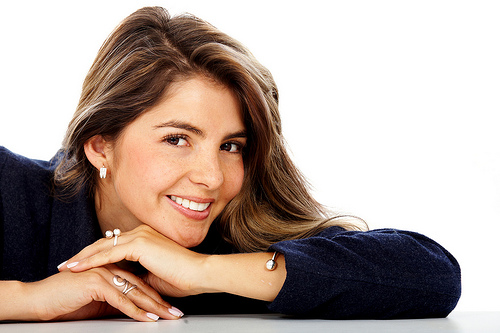February 28th, 2018

At Smiles By Beck, we see a lot of patients who are concerned about their bad breath, also known as halitosis. So today we thought we would educate our patients about what you can do to keep your pearly whites clean and your breath minty fresh!
Naturally, good oral hygiene on your part is the first step. With proper brushing and flossing you can keep halitosis in check. Even though you may have done an excellent job of brushing and flossing your teeth, if you fail to brush your tongue, you may still have bad breath. Bad breath is caused by odor-producing bacteria that grow in your mouth. Certain foods, medications, smoking, sinus issues, or even gum disease can cause bad breath.
Besides proper brushing and flossing, bad breath can be prevented if you:
Stop smoking/chewing tobacco-based products: Ask Drs. Julie Bailey, Jacob Woods, Marci, Glenn and Brian Beck and our team for tips on kicking the habit.
Keep your mouth hydrated: Because a dry mouth typically leads to bad breath, drinking water or eating oranges or celery may help.
Visit our Tallahassee, FL office for regular dental checkups: By visiting Smiles By Beck at least twice a year, you will keep bad breath at bay. Drs. Julie Bailey, Jacob Woods, Marci, Glenn and Brian Beck will conduct an oral exam and will be able detect and treat periodontal disease, dry mouth, or other problems that may be the cause of bad mouth odor.
February 21st, 2018

When children lose baby teeth, it’s a time to rejoice. But when adults suffer from tooth loss, it may be a sign of a serious problem. That’s when it’s time to give us a call at Smiles By Beck.
What are the reasons for missing teeth?
The loss of permanent teeth can occur for a variety of reasons, ranging anywhere from hereditary factors to tooth decay to traumatic injury. Here are the following reasons why adults suffer tooth loss:
- Gum disease: The number one cause of lost teeth in adults is gum disease, also known as periodontal disease, an infection of the structures that support the teeth. Once gum disease reaches and destroys the alveolar bone, the teeth begin to loosen and will eventually fall out or need to be extracted.
- Tooth decay: If cavities are left untreated, they can destroy tooth structure as well as cause infection in the supporting bone.
- Tooth injury: An injury can either knock out a tooth immediately or cause damage to the root or pulp that will later require extraction. We recommend using a mouthguard if you play sports.
- Tooth fracture: A fracture in a tooth is often caused by teeth grinding, or what Drs. Julie Bailey, Jacob Woods, Marci, Glenn and Brian Beck and our team call bruxism. A crown may be the answer, but depending on the location of the crack or fracture and how deeply it extends, the tooth may not respond well to repair with a crown and may need to be extracted instead.
What are the risk factors for tooth loss?
- Poor oral hygiene: Patients who only occasionally brush or floss their teeth are more likely to develop tartar, plaque buildup, and other bacteria that cause decay.
- Not visiting the dentist: Seeing Drs. Julie Bailey, Jacob Woods, Marci, Glenn and Brian Beck every six months for a cleaning and checkup prevents any developing oral health issues, as well as ensures that plaque and tartar do not build up over time.
- Smoking: Smokers and users of smokeless tobacco are more likely to develop periodontal disease that can cause tooth loss. If you are a smoker it is crucial to visit us on a timely schedule.
- Various health conditions: Patients with high blood pressure, diabetes, rheumatoid arthritis, and other chronic health issues are more likely to suffer from gum disease.
Scheduling an appointment with Drs. Julie Bailey, Jacob Woods, Marci, Glenn and Brian Beck at our Tallahassee, FL office will give you an accurate diagnosis and a variety of treatment options. It’s important to know that periodontal disease is “silent,” meaning you will not always experience pain as a signal of infection. When caught early, treatments are usually successful.
Give us a call today to schedule your next visit!
February 14th, 2018

Did you know the actions leading to the beginnings of Valentine's Day were actually centered on the avoidance of war? A Catholic priest named Valentine defied the orders of the Emperor Claudius II and secretly married young men and their brides after the emperor had declared it illegal because only single, young men could be sent to war. Rather than lose potential soldiers to fight his war, Claudius attempted to hoard them by proclaiming marriage illegal.
Valentine continued to marry young couples anyway and, eventually, was put to death for it in 270 AD. Before his death, he sent a letter to a secret love and signed it “From your Valentine”. Nearly 1,800 years later, people are still signing letters and cards in this manner. This year, carry on the tradition started long ago, while adding your own twist. Here are a few suggestions.
Simple and Creative Valentine's Day Ideas
- Memorialize it with a Photo. Couples often have photos taken around Christmas, but Valentine's Day photos allow you to capitalize on romance. Famous couple Julia Child and her husband, Paul, had their picture taken together every Valentine's Day and included their sense of humor with silly props.
- Return to Your First Date Location. Even if your first date together was at a local hotdog stand, its sentimental value can make it a fun part of your Valentine's Day agenda. Be creative and make a treasure hunt with clues that lead your partner to the original date location, where you can express your love with flowers or a gift.
- “From Your Valentine” Messages. Deliver your message in a creative way to make this Valentine's Day stand out from the others. Bake your partner's favorite treat and write a message on it with a tube of icing, or draw a note on the steamed up mirror so it shows up when your partner takes a shower.
Although Valentine's Day is a day to celebrate love, it doesn't have to be a special day only for couples. If you're single, use this special day to shower yourself with love, because you're worth it! After all, the priest Valentine believed so strongly in the sanctity of love that he was willing to risk his life for it. Whether you're in a relationship or single, young or old, romantic or not, Valentine's Day is for you. Happy Valentine’s Day from the dental office of Drs. Julie Bailey, Jacob Woods, Marci, Glenn and Brian Beck.
February 7th, 2018

If you or your children suffer from dental anxiety, you aren’t alone. According to the Cleveland Clinic, between nine and 15 percent of Americans admit to feeling sufficiently afraid of going to the dentist to avoid making an appointment. The potential consequences of dental anxiety extend beyond poor oral health. Lack of dental care can cause serious but easily preventable medical conditions.
Dental Anxiety versus Dental Phobia
Dental anxiety provokes a sense of fear in people, typically before they arrive at Smiles By Beck. Those fears or worries are often exaggerated. Dental phobia shares many of the symptoms that characterize dental anxiety. It is a much more serious manifestation of that anxiety, and may provoke a sense of panic or terror in people. While people who suffer from dental phobias know that their feelings are irrational, they are unable to control, stop, or change those thoughts.
People who have dental phobias often avoid going to the dentist, and they come up with every possible excuse to justify not going. The only time a person who suffers from a dental phobia will go to the dentist is when he or she is forced to do so, or because of intense tooth pain. People who have dental anxiety don’t go to such extremes to avoid going to the dentist; anxiety usually begins in anticipation of the appointment.
What We Do to Ease Patient Anxiety
Drs Marci, Glenn and Brian Beck and our staff have many techniques we can use to help patients feel more comfortable at their appointments. Dental Fear Central gives some simple suggestions to help children and adults who are apprehensive about going to the dentist, even if they suffer from the more severe form of anxiety: full-blown dental phobia.
- The Tell-Show-Do Approach: We help our patients relax by making sure they understand what is involved in the exam and any procedure they may undergo. We tell patients about the procedure, show them the tools and equipment we intend to use, and answer questions before actually performing the procedure. This is helpful for patients who don’t know what to expect.
- Distraction: We offer personal music players and a collection of CDs that patients can listen to. The relaxing qualities of music may help distract a patient enough to make the process less stressful. In-office televisions allow you to watch TV while waiting for your appointment.
Drs Marci, Glenn and Brian Beck and our staff know that some patients are anxious about dental treatment, and we go to great lengths to make you feel more comfortable. Good oral health is very important, and when your mouth isn’t healthy, you can suffer from many other easily preventable medical problems.





 Website Powered by Sesame 24-7™
Website Powered by Sesame 24-7™